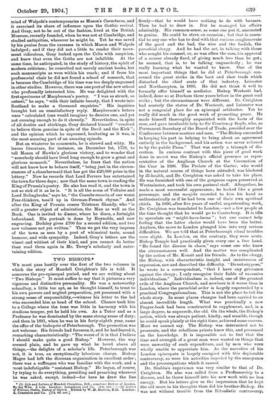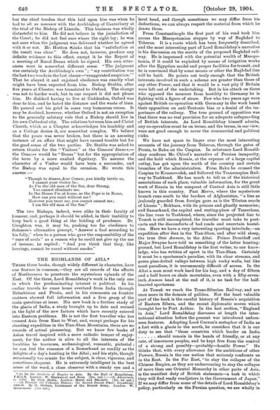WE must pass hastily over the first of the two
volumes in which the story of Mandell Creighton's life is told. It concerns the pre-episcopal period, and we are writing about " Two Bishops." It must suffice to say that it pictures a very vigorous and distinctive personality. He was a noteworthy schoolboy, a little too apt, as he thought himself, to trust to his own powers and neglect preparation, yet possessed with a strong sense of responsibility,—witness his letter to the lad who succeeded him as head of the school. Chance took him to a College where the tone was little in harmony with his studious temper, yet he held his own. As a Tutor and as a Professor he was dominated by the same strong sense of duty; and then in 1891, when he was in his forty-eighth year, came the offer of the bishopric of Peterborough. The promotion was not welcome. His friends had foreseen it, and he had feared it, remarking characteristically : "The worst of it is that I believe I should make quite a good Bishop." However, the way seemed plain, and he gave up what he loved above all things,—the delights of a scholar's life. Peterborough was not, it is true, an exceptionally laborious charge. Bishop Magee had left the diocesan organisation in excellent order ; there was a suffragan who was familiar with the work, and a most indefatigable "assistant Bishop." He began, of course, by trying to do everything, presiding and preaching wherever he was asked, except, indeed—for here he drew the line • (1) Life and Letters of Mandel/ Creighton, D.D., sometime Bishop of London. 113( his Wife. 2 vole. London : Longman* and Co. [23.. net.1 —(2) Letters William Stubbs, Bishop of Oxford. Edited by W. ,11.. Hutton, B.D. London : Constable and Co. 1.17s. 6& net.] firmly—that he would have nothing to do with bazaars. Then be had to draw in. But he managed his affairs admirably. His common-sense, as some one put it, amounted to genius. He could be stern on occasion ; but that is essen- tial to any one who has to deal with that curious conglomerate of the good and the bad, the wise and the foolish, the parochial clergy. And he had the art, in talking with those who sought his counsel, or, as was often the case, his approval of a course already fixed, of giving much less than he got ; he seemed, that is, to be talking unguardedly ; ho was really learning what he wanted to know. One of the most important things that he did at Peterborough con- cerned the great strike in the boot and shoe trade which disturbed the chief seats of that industry, Leicester and Northampton, in 1895. He did not think it well to formally offer himself as mediator. Bishop Westcott had, indeed, done so at Durham three years before in the great coal strike ; but the circumstances were different. Dr. Creighton had scarcely the status of Dr. Westcott, and Leicester was not a congenial place for an episcopal arbitrator. Yet he really did much in the good work of promoting peace. He made himself thoroughly acquainted with the facts of the case, and gave invaluable help to Sir Courtenay Boyle, who, as Permanent Secretary of the Board of Trade, presided over the Conference between masters and men. " The Bishop succeeded in keeping his part in helping to bring about an agreement entirely in the background, and his action was never referred to by the public Press." That was surely a triumph of dis- cretion. In curious contrast with this piece of good work done in secret was the Bishop's official presence as repre- sentative of the Anglican Church at the Coronation of the Czar in 1896. The Prelate of the Garter, who would in the natural course of things have attended, was hindered by ill-health, and Dr. Creighton was asked to take his place. He was furnished with one of the gorgeous capes preserved at Westminster, and took his own pastoral staff. Altogether, he made a most successful appearance; he looked like a great personage, and the muujiks crowded to kiss his hand as enthusiastically as if he had been one of their own spiritual chiefs. In 1896, after five years of useful, unpretending work, Dr. Creighton was translated to London,—not a few people at the time thought that be would go to Canterbury. It is idle to speculate on " might-bave-been " ; but one cannot help feeling that the latter choice would have been the better. Anyhow, the move to London plunged him into very serious difficulties. We are told that at Peterborough ritual troubles were slight. In London, on the contrary, they were acute. Bishop Temple had practically given every one a free hand. "He found the diocese in chaos," says some one who knew the circumstances well. And the matter was complicated by the action of Mr. Kensit and his friends. As to the clergy, the Bishop, with characteristic insight and incisiveness of expression, saw and described the difficulty. "Do not suppose," he wrote to a correspondent, " that I have any grievance against the clergy ; I only recognise their foible of excessive individualism." Individualism is, indeed, one of the greatest evils of the Anglican Church, and nowhere is it worse than in London, where the parochial order is largely superseded by a practical Congregationalism. This is not the place to tell the whole story. In some places changes had been carried to an almost incredible length. What was practically a new Prayer-book had been constructed to supplement, and, in a large degree, to supersede, the old. On the whole, the Bishop's action, which was always patient, kindly, and sensible, though he could speak plainly at the right time, achieved some success. More we cannot say. The Bishop was determined not to prosecute, and the rebellious priests knew this, and presumed on the knowledge. It is impossible not to feel that the time and strength of a great man were wasted on things that were unworthy of such expenditure, and by men who were wholly unable to appreciate him. As the narrative of his London episcopate is largely occupied with this deplorable controversy, so were his activities impeded by the annoyance and the preoccupations which it caused.
Dr. Stubbs's experience was very similar to that of Dr. Creighton. He also was called from a Professorship to a diocese, and he threw himself into his new work with no less energy. But his letters give us the impression that he kept the old more in his thoughts than did his brother-Bishop. He was not without trouble from the Ritualistic controversy, but the chief burden that this laid upon him was when he had to sit as assessor with the Archbishop of Canterbury at the trial of the Bishop of Lincoln. This business was wholly distasteful to him. He did not believe in the jurisdiction of the Court ; he did not feel sure where the right lay ; he was not sure when the judgment was delivered whether he agreed with it or not. Mr. Hutton 'thinks that his " satisfaction at the result was clear." He does not, however, produce any definite evidence to this effect, except it be the Report of a meeting of Rural Deans which he signed. His own utter- ances were in somewhat different sense. " The judgment was certainly the Archbishop's own " ; "my contribution was the last two words in the last clause—'exaggerated suspicion. " That be obeyed it and enjoined obedience was exactly what might have been expected from him. Bishop Stubbs, after five years at Chester, was translated to Oxford. The change was not to harder work, but in one respect it did not please him. He disliked having to live at Cuddesdon, Oxford was dear to him, and he hated the distance and the waste of time.
He poured out his grief in some very humorous verses. It may be doubted, however, whether Oxford is not an exception to the generally salutary rule that a Bishop should live in his own Cathedral city. The relations between him and Christ Church, which as a Chapter acknowledges his headship and as a College denies it, are somewhat complex. We believe that the peace was never broken, but there is an amusing instance of an affair that might have caused trouble but for the good sense of the two parties. Dr. Stubbs was asked to return thanks for the " Visitors " at the Censors' dinner,— the Censors would be "Deans" but for the appropriation of the term by a more exalted dignitary. To assume the character of a Visitor would have been a surrender, and the Bishop was equal to the occasion. He wrote this "Though to dinner, dear Censor, you kindly invite us, I cannot your visitor be ; As I'm the old man of the See, dear Strong, You cannot eliminate me.
In the House I'm at home, as the Pope is in Rome, How can you exist without me ?
However you treat me, you cannot unseat me ; I am the old man of the See."
The two Bishops, indeed, were alike in their faculty of humour, and, perhaps it should be added, in their inability to keep back a good thing at the bidding of prudence. Dr, Creighton was, it may be, pushing too far obedience to Solomon's alternative precept, " Answer a fool according to his folly," when to a parson who gave the responsibility of the cure of souls" as a reason why he could not give up the use .of incense, he replied ; " And you think that they, like herrings, cannot be cured without smoke."



















































 Previous page
Previous page